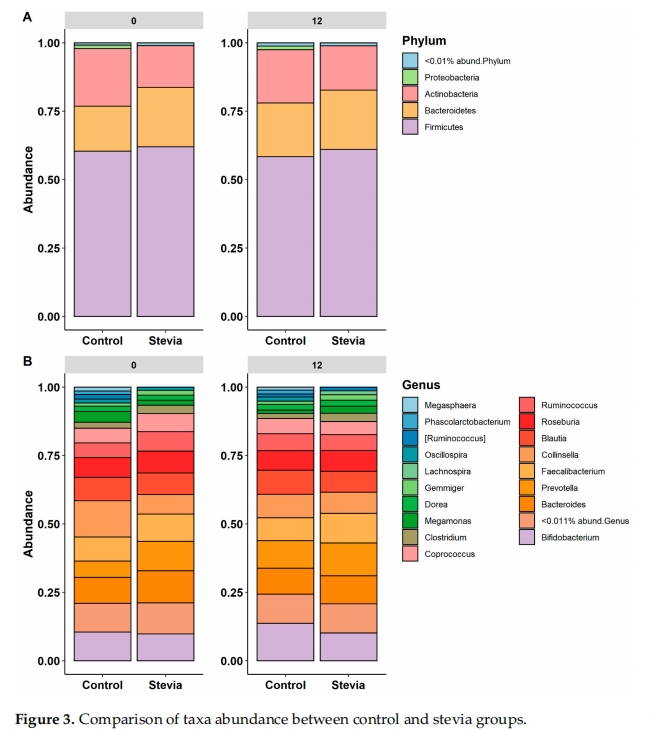
01 Jan
Further Exploration on the Effects of Sweetener Stevia on Human Gut Microbiota

1. Introduction
The gut microbiota has long been regarded as one of the key elements contributing to the regulation of host health. Any changes in the composition or quality of the gut microbiota may have physiological consequences for the host. To determine the effect of sweetener stevia (also known as stevioside) on the gut microbiome of healthy population, the stool samples are collected from healthy participants who consume with or without five drops of the sweetener stevia twice daily. Following analyses of 16S rRNA sequencing method, no large-scale change is found in the gut microbiota post 12 weeks of consumption with stevia, hinting the safety of stevia.
2. Insignificant changes in the alpha or beta diversity following consumption of stevia

It is discovered that there is no significant difference in alpha diversity (in terms of observed taxa, evenness and Shannon Index) and beta diversity (with regard to PCoA, PERMANOVA, and Jaccard Index) between groups. Nevertheless, PCoA plots shows strong separation along the x-axis. In addition, the community composition in each group is relatively even over time and equally diverse.

3. No clear difference in relative abundances of taxa
At the genus level, relative abundances are similar between the control and stevia groups. No major difference is observed in relative abundances at the class, order and family level. Strikingly, butyricoccus is the only one identified taxon exhibiting significant difference at baseline, but not after 12 weeks of stevia consumption. Moreover, Collinsella and Aldercreutzia are two coprococcus species identified as explicitly different at baseline (one higher and one lower when comparing stevia vs. control), which however are significantly elevated after 12 weeks of consumption with stevia.


4. The safe intake volume of sweetener steviol glycosides
In the European Food Safety Authority (EFSA), there is a Panel on Food Additives and Flavourings (FAF), which is responsible for evaluating the safety of food additives and establishing acceptable daily intake levels for safe use. Steviol glycosides, one of the extract from stevia, is evaluated by the FAF as well. In accordance to the latest toxicological test, this sweeter is not genotoxic and carcinogenic, without any adverse effects on the human reproductive system or growing children.
The expert group has set the acceptable daily intake (ADI) of steviol glycosides at 4 milligrams per kilogram of body weight per day, which is consistent with the level determined by the Joint Expert Committee on Food Additives (JECFA) administered by the US Food and Agriculture Organization (FAO) and the World Health Organization (WHO).
The expert group has set the acceptable daily intake (ADI) of steviol glycosides at 4 milligrams per kilogram of body weight per day, which is consistent with the level determined by the Joint Expert Committee on Food Additives (JECFA) administered by the US Food and Agriculture Organization (FAO) and the World Health Organization (WHO).
5. Conclusion
Regular, long-term consumption of stevia does not overtly alter the composition of the human gut microbiotia. Stevia can be safe as long as the intake volume is controlled appropriately.
Reference
Singh G, McBain AJ, McLaughlin JT, Stamataki NS. Consumption of the Non-Nutritive Sweetener Stevia for 12 Weeks Does Not Alter the Composition of the Human Gut Microbiota. Nutrients. 2024;16(2):296. Published 2024 Jan 18. doi:10.3390/nu16020296
BONTAC Stevia/Stevioside (RD)

BONTAC has been dedicated to the R&D, manufacture and sale of raw materials for coenzyme and natural products since 2012, with self-owned factories, over 170 global patents as well as strong R&D team consisting of Doctors and Masters. Patent-grade Stevia Reb-D (US11312948B2 & ZL2018800019752) is availbale at BONTAC. High quality and stable supply of stevioside Reb-D can be better ensured here with the exclusive Bonpure seven-step purification technology and Bonzyme Whole-enzymatic method.
Disclaimer
This article is based on the reference in the academic journal. The relevant information is provide for sharing and learning purposes only, and does not represent any medical advice purposes. If there is any infringement, please contact the author for deletion. The views expressed in this article do not represent the position of BONTAC.Under no circumstances will BONTAC be held responsible or liable in any way for any claims, damages, losses, expenses, costs or liabilities whatsoever (including, without limitation, any direct or indirect damages for loss of profits, business interruption or loss of information) resulting or arising directly or indirectly from your reliance on the information and material on this website.
